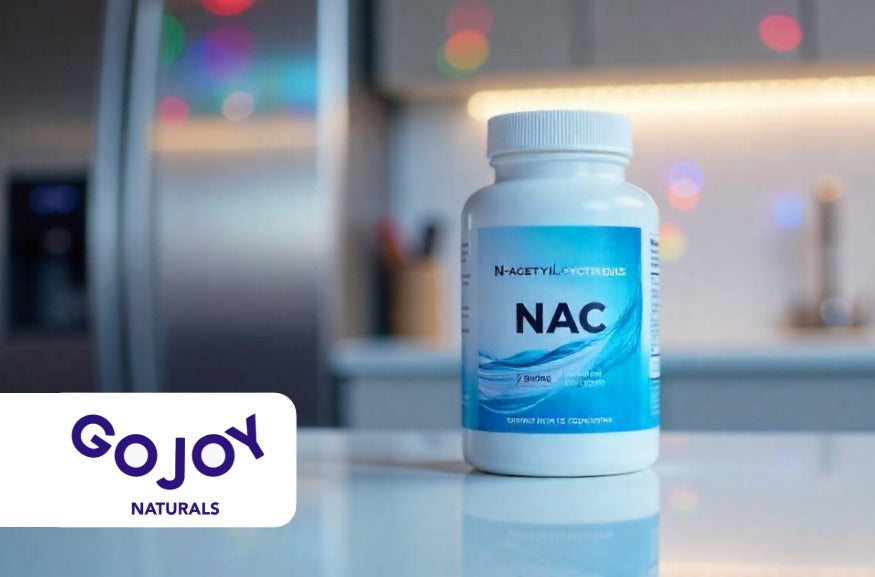How to Reduce Oxidative Stress?
Oxidative stress can be the sneaky culprit behind many of your daily struggles. You’re doing everything you can to keep your life going as best as possible, but you’re simply unable to be as productive as you used to be. What’s going on?
Chances are that you have oxidative stress, and you don’t even know about it. Oxidative stress can damage your cells, drain your energy, reduce your immunity, and fatigue your muscles. But what exactly is it? And how to reduce oxidative stress?
In this guide, we’ll answer these questions, plus some more.
Key Takeaways
-
Oxidative stress occurs when free radicals overwhelm your body's antioxidants, causing fatigue, brain fog, premature aging, and weakened immunity throughout your system.
-
Combat oxidative stress by eating antioxidant-rich foods like berries, leafy greens, nuts, and green tea while avoiding processed foods and managing stress levels.
-
Quality sleep, regular exercise, stress management, and targeted supplements like NAC and vitamin C help restore the balance between free radicals and antioxidants.
What Is Oxidative Stress?
Oxidative stress occurs when there is an imbalance between free radicals—unstable molecules that can damage cells—and the body’s ability to neutralize them with antioxidants.
This imbalance can lead to cellular damage, affecting various tissues and organs. Over time, oxidative stress contributes to aging and plays a role in the development of several chronic conditions, including cardiovascular disease, diabetes, and skin aging.
Note that free radicals are a natural byproduct of metabolism in our bodies. However, factors like environmental pollutants, processed foods, and chronic stress (pretty much the description of our lives now) can increase their levels, which can overwhelm the body’s immunity.
Causes of Oxidative Stress
We talked about them at a glance, but we need to break them down:
-
Processed Foods: Diets high in processed foods introduce harmful compounds and reduce the intake of natural antioxidants, tipping the balance toward oxidative damage.
-
Chronic Stress: Prolonged psychological or physical stress increases free radical production and weakens antioxidant defenses.
-
Environmental Pollutants: Exposure to toxins such as cigarette smoke, heavy metals, and air pollution contributes to oxidative stress.
-
Excessive Sun Exposure: Ultraviolet (UV) radiation accelerates free radical formation in the skin, leading to premature aging.
-
Poor Sleep and Sedentary Lifestyle: Both can impair the body's natural antioxidant systems.
-
Certain Medications and Alcohol: These can increase oxidative stress by generating free radicals or depleting antioxidants.
Signs and Symptoms of Oxidative Stress
Fatigue and Low Energy
When oxidative stress damages mitochondria—the energy producers in cells—fatigue and reduced stamina can occur, making everyday tasks feel more exhausting. Brushing your teeth is suddenly too exhausting? You’re actually not imagining it.
Premature Skin Aging
Oxidative stress breaks down collagen and elastin in the skin, leading to wrinkles, dryness, and loss of elasticity earlier than expected.
Frequent Infections
A weakened immune system due to oxidative damage can result in increased susceptibility to infections and slower recovery times. That’s why you may get back-to-back infections even if you’re doing your best to take care of your health.
Brain Fog and Difficulty Concentrating
Oxidative stress affects brain cells, potentially causing memory lapses, difficulty focusing, and mental fatigue. You’re not getting old and forgetful; your brain is just exhausted.
Muscle Weakness and Joint Pain
Inflammation triggered by oxidative stress can cause muscle soreness and joint discomfort, impacting mobility and quality of life.
How to Reduce Oxidative Stress?
Reducing oxidative stress will require a combination of dietary choices, lifestyle habits, and targeted supplementation to restore balance between free radicals and antioxidants in the body.
This approach not only helps protect cells from damage but also supports your overall health; it makes you feel alive.
1. Emphasize an Antioxidant-Rich Diet
A cornerstone of reducing oxidative stress is consuming a variety of foods rich in antioxidants. These compounds neutralize free radicals, preventing them from damaging cells and DNA. Some of the best food options you have are:
-
Citrus fruits and berries: Oranges, lemons, strawberries, and blueberries are high in vitamin C, a potent antioxidant that supports immune function and skin health.
-
Dark leafy greens: Spinach, kale, and Swiss chard provide vitamins A, C, and E, along with polyphenols that combat oxidative damage.
-
Nuts and seeds: Almonds, walnuts, and sunflower seeds are excellent sources of vitamin E, which protects cell membranes from oxidative harm.
-
Spices and herbs: Turmeric, cinnamon, and ginger contain bioactive compounds that reduce inflammation and oxidative stress.
-
Green tea: Rich in catechins, green tea supports antioxidant defenses and may improve cellular health.
-
Whole grains: Brown rice, quinoa, and barley provide antioxidants and fiber, replacing processed foods that can increase oxidative stress.
2. Manage Chronic Stress and Prioritize Sleep
Chronic stress increases free radical production and weakens antioxidant defenses. Incorporating stress-reduction techniques such as mindfulness, meditation, yoga, or simply spending time in nature can significantly lower oxidative stress levels.
Additionally, aim for 7–9 hours of quality sleep each night, as sleep is essential for cellular repair and antioxidant activity.
3. Avoid or Limit Lifestyle Factors That Increase Oxidative Stress
-
Quit smoking: Tobacco smoke introduces a high load of free radicals.
-
Limit alcohol consumption: Excessive alcohol consumption increases oxidative damage.
-
Protect skin from UV exposure: Use sunscreen and protective clothing to reduce oxidative stress caused by ultraviolet radiation.
-
Reduce intake of processed foods: These often contain additives and unhealthy fats that promote free radical formation.
4. Support Your Body with Targeted Oxidative Stress Supplements
While a nutrient-rich diet is foundational, supplements can provide additional support to combat oxidative stress at the cellular level. GOJOY’s Nacsentials Advanced Antioxidant Gummies combine key antioxidants and nutrients designed for cellular defense and skin health.
These sugar-free gummies are non-GMO and soy-free, making them a convenient and clean option to boost your antioxidant intake.
The primary ingredients include:
-
N-Acetyl Cysteine (NAC): A precursor to glutathione, one of the body’s most powerful antioxidants, NAC helps boost glutathione levels to neutralize free radicals effectively.
-
Vitamin C: Essential for collagen synthesis and immune support, vitamin C also regenerates other antioxidants in the body.
-
Alpha Lipoic Acid: A versatile antioxidant that works in both water- and fat-soluble environments, helping to reduce oxidative stress throughout the body.
-
CoQ10: Supports mitochondrial function and protects cells from oxidative damage.
-
Curcumin: The active compound in turmeric, known for its anti-inflammatory and antioxidant properties.
-
Resveratrol: A polyphenol with antioxidant benefits, often regarded as one of the best resveratrol supplements for cellular protection.
Final Words
Oxidative stress can make your life a lot harder than it should be. The good news is that eating two gummies of GOJOY NACsentials a day should fix your problem within a couple of weeks. It really is that simple.
The gummies are tasty, sugar free, soy free, non-GMO, and extremely convenient to carry around anywhere you go.
Plus, antioxidants aren’t the only ingredients; the gummies are loaded with vitamins, ALA, and more. Your body will thank you. Find more healthy gummies at GOJOY, and contact us if you have any questions.






